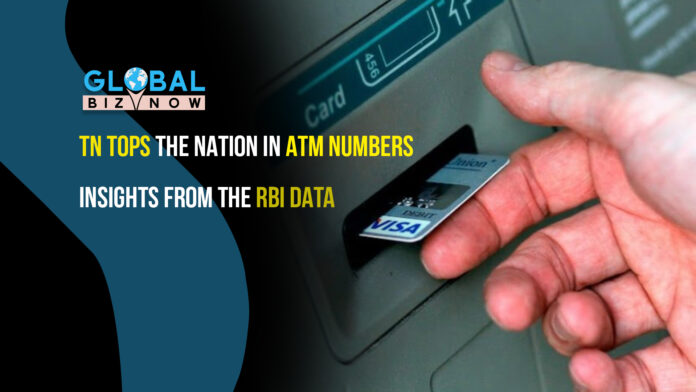According to the latest RBI Data, Tamilnadu has the maximum number.of Automatic Teller Machines(ATMs), Cash Recycler Machines(CRMs) and White Label ATMs(WLAs) among the major states in India.
Tamilnadu accounts for 11.7% or 29,965 ATMs, CRMs, WLAs in the country gives a sense of how capable the financial infrastructure of the state is and the level of monetary activity happening within the state. The high percentage can be interpreted in many ways and gives essential insights regarding the state’s banking and economic landscape.
Key Insights and Analysis
- Strong Financial Inclusion
ATMs and CRMs are considered as one of the most important steps of the financial inclusion process. Such facilities are provided near all places so that people can access the banking services, especially in semi-urban and rural areas. Without a doubt, banks have a good presence in Tamil Nadu’s population wherein large numbers of ATMs and CRMs are operational.
Tamil Nadu accounts for 11.7% of the country’s ATMs, CRMs, and WLAs; it thus significantly contributes to promoting financial inclusion across various socio-economic groups, especially the remote rural areas that otherwise could not have accessed banking.
- High Banking Penetration
Tamil Nadu’s contribution to the ATM and CRM count for India underlines the fact that a state has a high degree of banking penetration. This, in turn, is an important factor in increasing the total economic activity of the state because it provides cash withdrawal, deposit, and other financial transactions more efficiently.
This is also interpreted as a good indicator of the infrastructure provided by the banks in response to high demand for cash and digital banking services, with a significant number of ATMs and CRMs.
- Strong Presence of Public and Private Sector Banks
It can be taken from data that both state-based public and private sector banks have their presence diversified in the state with 13,367 ATMs by public sector banks and 10,506 ATMs by private sector banks
A greater number of Cash Recycler Machines would therefore denote an attempt at streamlining cash circulation with enhanced ease in making both deposits and withdrawals in the economy. Thus the competitive banking environment provides the consumers with a lot of choices.
The state also boasts of a high number of ATMs, thereby speaking to the strategic investment that has been made by both public and private banks in their infrastructure development in Tamil Nadu with a growing urban and rural customer base.
- Potential for Growth in Financial Services
The state boasts an attractive market with a high share of the country’s ATMs and CRMs, thus putting the state in an imperative position as a hub for the growth of financial technologies, lending, and other cash-generating, ATM-based financial services.
A high presence of WLAs reveals an easily available opportunity for participating non-bank entities in providing cash access and other banking services, thereby fostering innovation and competition in the financial sector.
- Economic Growth & Urbanization
The high ATM and CRMs counts correlate with the overall economic growth and urbanization of the state. Large cities like Chennai, Coimbatore and Madurai, accompanied by several industrial zones and economic hubs, contribute to a large volume of financial transactions.
The concentration of financial infrastructure is particularly crucial in areas of high business, tourist, and educational institutions concentration, all factors that increase the demand for cash and electronic banking facilities.
- Removing the Regional Disparities in ATM Distribution
Tamil Nadu’s ATM distribution indicates a desire to close out the urban-rural gap. While it is obvious that a city center will tend to have more, the steady rise of the numbers of CRMs and WLAs in rural and under-served locations speaks of its commitment of serving the wider population.
7. Job Creation
In fact, the large presence of banking infrastructure is supporting employment generation in the state. Right from installation of ATMs to the WLAs and CRMs’ and its maintenance and operations. It also creates employment in the banking and financial technology sectors.
8. Tourism and Industry Support
Tamil Nadu’s tourist spots and large industrial sectors benefit from widespread ATM access, ensuring that both tourists and businesses can easily access cash and conduct transactions.
9. Innovation & Financial Technology (Fintech) Potential
With an increasing ATM infrastructure and the presence of WLAs, Tamil Nadu is in a favourable position for fintech growth. Non-bank players can innovate and expand in the state, improving access to capital, credit, and digital payment systems.
Thus the high concentration of ATMs, CRMs, and WLAs in Tamil Nadu signals a well-developed banking ecosystem that supports financial inclusion, economic growth, and technological innovation. This infrastructure not only enhances convenience for the public but also lays the foundation for a more dynamic financial landscape, positioning Tamil Nadu as a leader in both banking services and financial technology in India.



